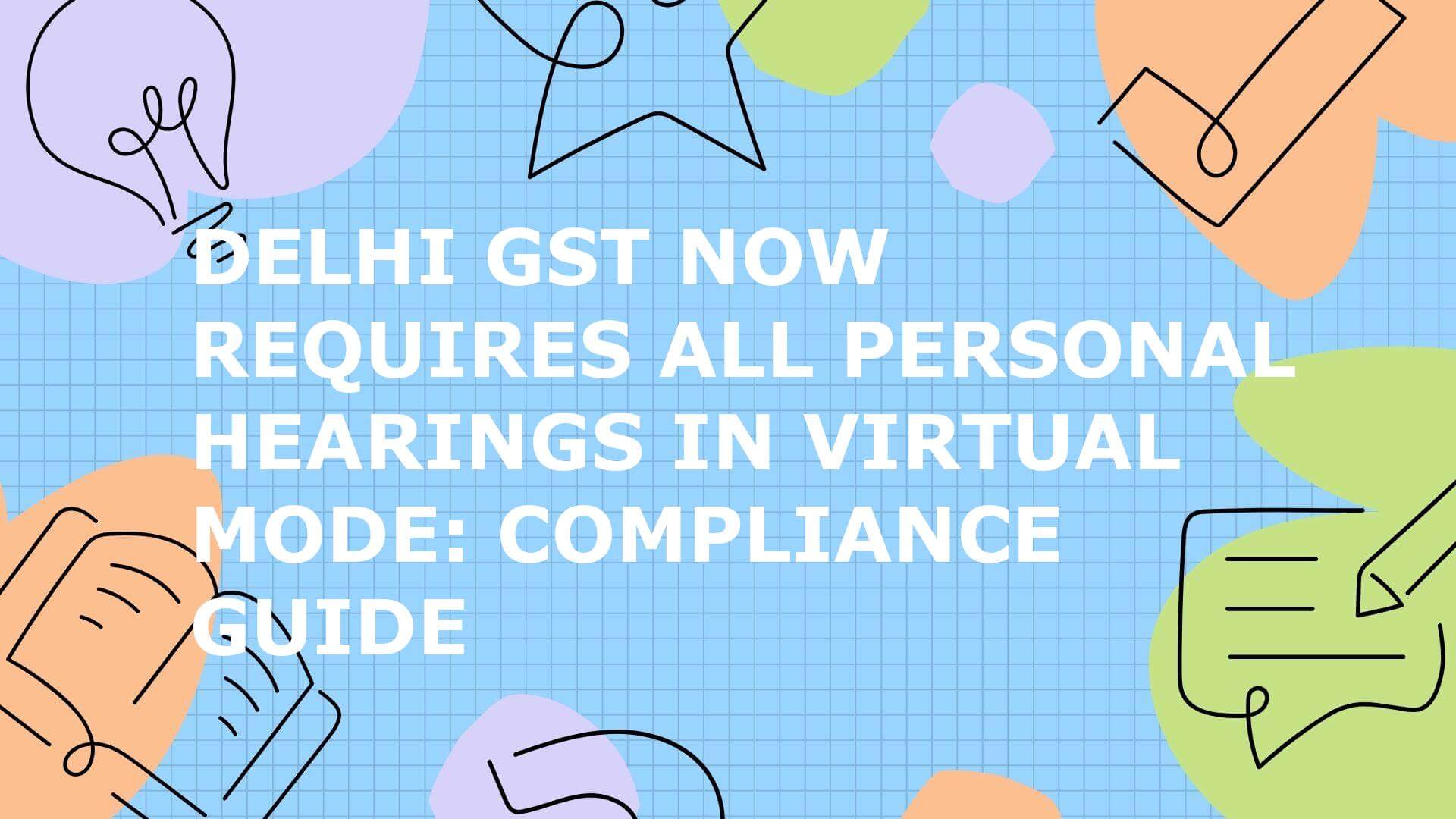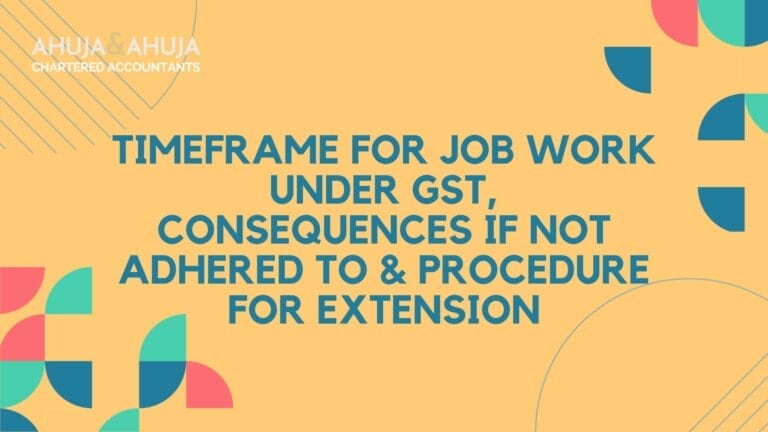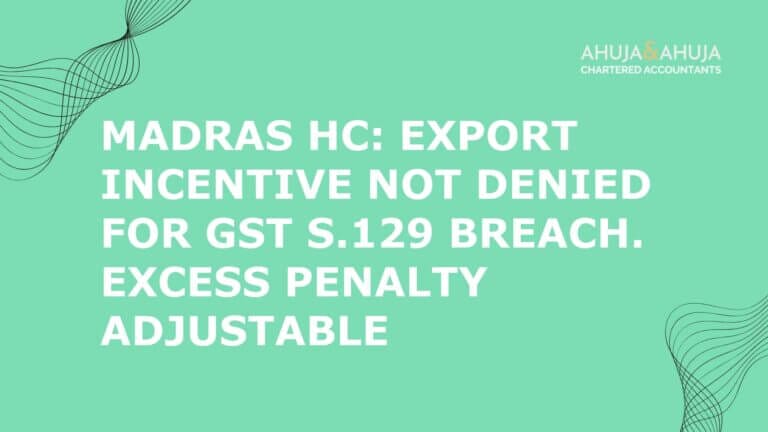Delhi GST Now Requires All Personal Hearings in Virtual Mode: Compliance Guide
The New Era of GST Hearings in Delhi
The Delhi GST Department has taken a decisive step towards modernising tax administration by mandating that all personal hearings—whether before Proper Officers or Appellate Authorities—will now be conducted exclusively in virtual mode. This move, formalised through a circular dated 13 June 2025, signals a shift towards a faceless, technology-driven system designed to enhance transparency, efficiency, and ease of compliance for taxpayers and professionals alike. For expert assistance with GST compliance in Delhi, you may consult our Delhi chartered accountants.
Why This Matters
Personal hearings are not just a procedural formality; they are a cornerstone of natural justice, ensuring that every taxpayer has a fair chance to present their side before any adverse order is passed. The new virtual mandate aims to preserve this right while leveraging technology to make the process more accessible and less intimidating. You can find more on the Right to Personal Hearing In Case of Adverse Order under GST to understand its importance in this context.
What’s Changing?
- All personal hearings under the Delhi GST Act, 2017, must now be held online—no physical appearance required.
- Platforms like WEBEX and Google Meet will be used for these hearings.
- Advance notifications will be sent to taxpayers and their representatives via registered email and mobile, including technical support details.
- Strict protocols for document submission, decorum, and record-keeping have been laid out to ensure legal validity and procedural fairness.
1. The Rationale and Legal Foundations
Statutory Backing
The mandate for personal hearings is deeply rooted in the Delhi GST Act, 2017:
- Section 75(4): Guarantees the right to be heard before any adverse order.
- Section 126(3): Reinforces the principles of natural justice in penalty proceedings.
- Section 107(8): Ensures the right to a hearing in appellate matters.
These provisions collectively ensure that the taxpayer’s voice is not just heard, but recorded and considered before any decision is made.
Natural Justice in a Digital Age
Natural justice is about more than just ticking boxes—it’s about real, meaningful participation. The virtual hearing model is designed to uphold these principles by:
- Providing clear, advance notice of hearings.
- Allowing taxpayers and their representatives to present evidence, make submissions, and respond to queries in real time.
- Ensuring that all proceedings are properly recorded and shared with the parties involved.
The Push for Faceless, Tech-Driven Tax Administration
Delhi’s move is part of a broader government vision to make tax administration less dependent on face-to-face interactions, thereby reducing subjectivity, potential harassment, and logistical hassles. The virtual model promises:
- Greater accessibility for taxpayers and professionals, regardless of location.
- Streamlined processes, reducing delays and paperwork.
- Enhanced transparency, with digital records and audit trails.
To explore more about the government’s initiatives, see our faceless assessment services.
2. Procedural Transition to Virtual Mode
The Mandate: Circular of 13 June 2025
The circular leaves no room for ambiguity: all personal hearings are to be conducted virtually. This applies to every stage—assessment, adjudication, and appeal—under the Delhi GST Act.
Applicability
- All hearings—including those before Appellate Authorities—are covered.
- The mandate applies to both new and ongoing cases, unless a rare exception is granted.
Notification & Transition
- Taxpayers and their authorised representatives will receive advance notice of the hearing date, time, and joining link via registered email and mobile.
- The communication will also include contact details for departmental staff who can assist with technical issues.
- Ongoing or previously scheduled in-person hearings will be automatically transitioned to virtual mode, with fresh notifications issued.
Communication Protocol
- All official communication—hearing links, adjournment notices, and records of proceedings—will be sent via email and, where possible, SMS.
- Parties are expected to acknowledge receipt and confirm their readiness.
Managing the Transition
- The Department has emphasised continuity: no case should be left in limbo due to the shift.
- Any technical or procedural difficulties must be reported promptly, with support available to ensure a smooth transition.
For support on managing GST notices and replies, refer to our guide on How to Reply to DRC-01C: Notice of ITC Mismatch GSTR-2B vs GSTR-3B.
3. Compliance Steps for Taxpayers and Authorised Representatives
What must you do to be ready for a virtual hearing? Here’s a stepwise guide:
3.1. Eligibility and Readiness Checklist
- Check your notifications: Ensure you have received the official email/SMS with hearing details.
- Confirm your role: Only the taxpayer or a duly authorised representative (Advocate, CA, etc.) can appear. Submit your authorisation letter (vakalatnama) and a copy of your photo ID well in advance.
- Provide contact details: Double-check that your email and mobile number are up to date with the Department.
3.2. Technical Setup
- Download the required application: Install WEBEX or Google Meet on your device (laptop, desktop, or smartphone).
- Test your internet connection: A stable, high-speed connection is essential. Consider a backup (mobile hotspot) in case of outages.
- Check your device: Ensure your camera, microphone, and speakers are working. Use headphones for better audio quality.
- Prepare your environment: Choose a quiet, well-lit space where you won’t be disturbed.
3.3. Document Submission Protocols
- Submit documents in advance: Email scanned, self-attested copies of your authorisation letter, photo ID, and any supporting documents to the Authority before the hearing.
- Follow timelines: Late submissions may result in denial of representation or adjournment.
- Physical documents: If specifically required, submit attested physical copies during working hours as per instructions.
3.4. Maintaining Decorum and Compliance
- Dress code: Formal or business attire is expected, just as in a physical hearing.
- Professional conduct: Maintain decorum—no background distractions, no unauthorised participants, and no recording unless permitted.
- Punctuality: Log in at least 10 minutes before the scheduled time.
Key Takeaway:
Preparation is everything. Treat a virtual hearing with the same seriousness as a physical one—both in terms of documentation and conduct.
For professional assistance with GST litigation and representation, consider our GST litigation services.
4. Authenticity and Legal Validity of Virtual Proceedings
The shift to virtual hearings raises a crucial question: Are digital proceedings and documents as legally robust as their physical counterparts? The answer, under the new Delhi GST guidelines, is a resounding yes.
4.1. Legal Recognition under DGST & IT Act, 2000
- Section 4 of the Information Technology Act, 2000 gives legal validity to electronic records and digital signatures. The Delhi GST circular explicitly states that all records, submissions, and proceedings conducted virtually are deemed valid under the law.
- The “Record of Personal Hearing” generated during the virtual session, signed and stamped by the Authority, is considered an official document.
4.2. Validity of Scanned and Digitally Signed Documents
- Self-attested scanned documents (authorisation letters, IDs, evidence) sent via official email are accepted as valid.
- Where required, digitally signed documents further strengthen authenticity.
- For any physical documents demanded, attested hard copies must be submitted as per instructions, but the digital version is the primary record.
4.3. Recording and Audit Trail
- Every virtual hearing is documented in the online PH (Personal Hearing) module.
- The signed PDF “Record of Personal Hearing” is shared with the taxpayer and their representative via email, ensuring transparency and traceability.
- All communications—hearing links, adjournment notices, and document submissions—are archived, creating a robust audit trail.
4.4. Safeguards Against Disputes
- E-mail confirmations and digital timestamps serve as proof of submission and participation.
- Any challenge to the authenticity of digital records can be countered with these audit trails and the legal backing of the IT Act.
4.5. Risk Mitigation
- Parties are advised to retain all email correspondence and digital records.
- In case of disputes, these records will be the first line of defence.
Key Takeaway:
Digital does not mean informal. Virtual records are fully enforceable and protected by law—just as in a physical hearing.
To complement this understanding, see our article on GST Notices Upload to GSTN Portal is Treated as Served : Delhi High Court.
5. Avoiding Procedural Pitfalls in Virtual Hearings
While the virtual model offers convenience, it also introduces new risks. Missing a step can cost you your right to be heard.
5.1. Common Pitfalls
- Missed notifications: Overlooking an email or SMS can result in ex-parte orders.
- Incomplete documentation: Failure to submit authorisation or supporting documents in time may bar participation.
- Technical failures: Poor connectivity, device issues, or unfamiliarity with the platform can disrupt proceedings.
5.2. Proactive Mitigation
- Acknowledge every notice: Respond promptly to all communications from the Department.
- Double-check documents: Ensure all required files are self-attested, legible, and sent to the correct email address.
- Conduct a technical dry-run: Test your setup a day before the hearing. Keep a backup device or internet connection ready.
5.3. Consequences and Rectification
- If you miss a hearing due to genuine technical issues, immediately inform the Authority and request an adjournment with supporting evidence (e.g., screenshots, error messages).
- The Department has protocols for rescheduling in such cases, provided the issue is reported promptly and documented.
Key Takeaway:
Diligence and preparation are your best safeguards. Treat every notification and deadline as critical.
6. Exceptions: Requesting In-Person Hearings
The virtual mandate is near-universal, but the Department recognises that rare situations may require a physical hearing.
6.1. Permissible Circumstances
- Medical emergencies
- Severe technical or accessibility issues
- Other compelling reasons (to be justified in writing)
6.2. Application Process
- Submit a written request to the Zonal In-Charge, clearly stating the grounds and attaching supporting documents (e.g., medical certificate, technical report).
- The Authority will review, record reasons, and communicate the decision.
6.3. Timelines and Communication
- Requests should be made well in advance of the scheduled hearing.
- Approval or denial, with reasons, will be communicated via email.
Key Takeaway:
Exceptions are rare and must be well-documented. The default is always virtual.
7. Ensuring Natural Justice in Virtual Hearings
A core concern is whether virtual hearings truly uphold the principles of natural justice.
7.1. Right to Be Heard
- The virtual process guarantees the taxpayer’s right to present their case, submit evidence, and respond to queries.
- The “Record of Personal Hearing” ensures that all submissions are officially noted.
7.2. Procedural Fairness and Transparency
- Advance notice, clear instructions, and the ability to submit documents electronically ensure procedural fairness.
- The process allows for interactive participation—taxpayers can clarify points, present evidence, and even request cross-examination where relevant.
7.3. Addressing Limitations
- The Department provides technical support to bridge digital divides.
- If language or technology is a barrier, parties can request assistance or, in rare cases, an in-person hearing.
7.4. Remedies for Denial
- If a party feels their right to be heard was compromised, they can appeal or seek redress, citing specific procedural lapses.
Key Takeaway:
Virtual does not mean less fair. The system is designed to protect your rights, provided you engage proactively.
8. Support and Redress Mechanisms
8.1. Technical Support
- Each hearing notification includes contact details for departmental staff who can assist with technical issues.
8.2. Reporting Difficulties
- Any technical or procedural problem should be immediately reported via email or phone, with documentation (screenshots, error logs).
8.3. Adjournment Protocols
- If a hearing cannot proceed due to technical glitches, the Authority will issue an adjournment notice with a new date.
8.4. Fairness in Rescheduling
- The Department aims to ensure that no party is prejudiced due to technical failures. All adjournments and rescheduling are documented and communicated.
Key Takeaway:
Help is available—don’t hesitate to reach out if you face issues.
9. Handling Submission of Documents: Digital and Physical Protocols
9.1. Digital Submission
- Preferred mode: Email scanned, self-attested documents before the hearing.
- Ensure files are clear, legible, and in the prescribed format (PDF, JPEG, etc.).
9.2. Physical Submission
- Only if specifically required by the Authority.
- Submit attested hard copies during working hours, as per instructions.
9.3. Receipts and Acknowledgement
- Always request and retain email acknowledgements for digital submissions.
- For physical documents, obtain a stamped receipt.
9.4. Avoiding Delays
- Submit all documents well before deadlines to avoid last-minute issues.
Key Takeaway:
Digital is the default, but follow instructions carefully if physical documents are needed.
10. Roles and Additional Obligations for Authorized Representatives
10.1. Ethical and Compliance Duties
- Representatives (Advocates, CAs, etc.) must ensure all submissions are accurate, timely, and properly attested.
- Confidentiality and professional conduct are paramount, even in a virtual setting.
10.2. Decorum and Representation
- Dress formally, maintain decorum, and ensure no unauthorised persons are present during the hearing.
10.3. Comparing Virtual and In-Person Obligations
- The standards of professionalism and ethics remain unchanged—if anything, virtual hearings demand even greater attention to detail and protocol.
10.4. Penalties for Misconduct
- Any breach—misrepresentation, unauthorised recording, or unprofessional conduct—can attract penalties and disciplinary action.
Key Takeaway:
Representatives must uphold the highest standards, regardless of the medium.
11. Practical Guidance for Businesses and Practitioners
11.1. Best Practices
- Prepare a checklist for every hearing: notifications, documents, technical setup, and backup plans.
- Conduct a mock session to familiarise yourself with the platform.
11.2. Compliance and Readiness
- Keep all communications and records organised.
- Update contact details with the Department regularly.
11.3. Troubleshooting Scenarios
- If you miss a hearing due to technical issues, document everything and request an adjournment immediately.
- For any confusion, reach out to the designated support staff.
11.4. Proactive Strategies
- Treat every virtual hearing as seriously as a physical one.
- Stay updated on Departmental circulars and FAQs.
For further help with GST return filing services, professionals in Delhi and neighbouring areas can rely on expert support.
12. Conclusion
Delhi’s move to mandatory virtual GST hearings is a landmark step towards a more transparent, efficient, and accessible tax administration. While the transition demands new skills and greater digital readiness, it also offers significant benefits—reduced travel, faster processes, and a robust digital audit trail.
Disclaimer
The materials provided herein are solely for educational and informational purposes. No attorney/professional-client relationship is created when you access or use the site or the materials. The information presented on this site does not constitute legal or professional advice and should not be relied upon for such purposes or used as a substitute for professional or legal advice.







